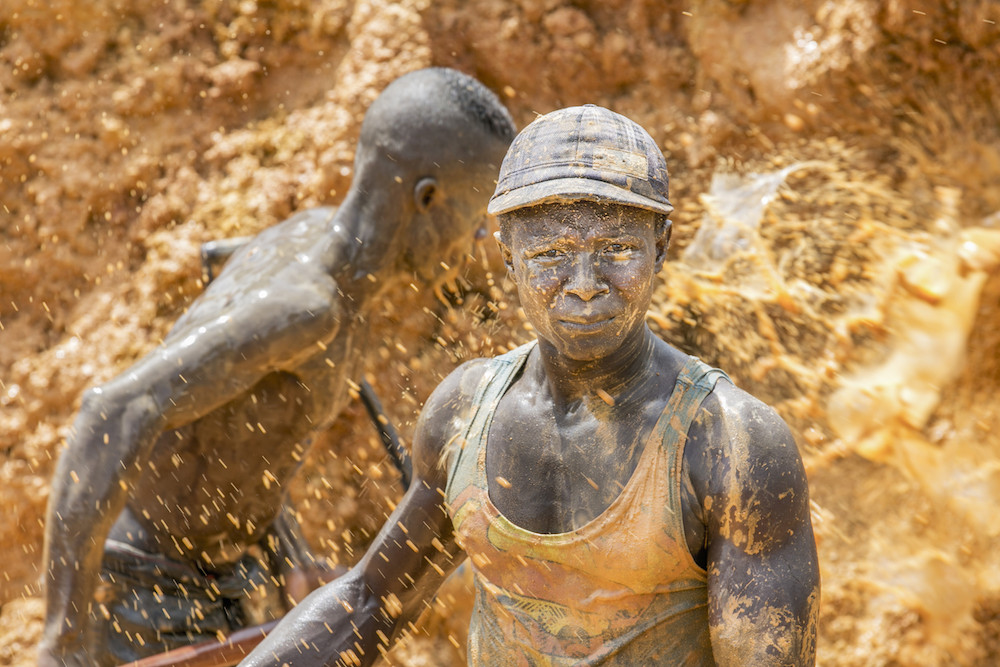The African continent, boasting an impressive 30% of the world’s mineral reserves and 40% of the world’s gold reserves, is plagued by a scourge of illegal mining. The Democratic Republic of Congo solely accounts for an impressive 75% of global cobalt production, the blood from these reservoirs of wealth continues to power our lives, yet the wealth generated from these vast resources comes at a steep cost. These illegal mining operations destabilise economies, compromise environmental sustainability, disrupt social structures, and ferociously violate human rights.
Illegal mining is ravaging communities across the continent, extraction of mineral resources such as gold, diamonds, and cobalt cause deforestation and land degradation. This practice has led to various devastating events such as environmental degradation, displacement of local communities, and human rights abuses. The consequences are far-reaching, including water pollution, deforestation, and soil contamination threatening biodiversity and food security. The exploitation of local miners, including children perpetuates poverty and human rights abuse. Furthermore, illegal mining fuels conflict, economic sabotage, and corruption. Countries like Ghana, the Democratic Republic of Congo, and South Africa are struggling to contain the perpetrators of these heinous crimes. Illegal mining has become a significant obstacle to achieving sustainable development goals, this further highlights the urgent need for governments and law enforcement to cooperate in combating this scourge.

The Dark Truth
Ghana, renowned for its rich gold deposits and long-standing mining legacy, faces a catastrophe due to ever spreading illegal small-scale gold mining also known locally as Galamsey. Derived from the famous mining phrase “gather them and sell” Galamsey is a century-old practice attracting between 20 000 to 50 000 workers comprising of locals and foreigners.
Galamsey, formerly praised as a job creator and exuberant catalyst of the Ghanaian economy is now a possible cause of an unprecedented disruption of life in Ghana. This illicit mining has devastating consequences, Ghana Water Company warns that unchecked water pollution from Galamsey may force Ghana to import water as soon as 2030. More research links this pollution to chronic diseases such as cancer, kidney failure, and birth defects in affected mining communities.
This environmental devastation extends beyond water bodies, the farmlands are equally under threat. A vital agricultural sector, Cocoa production, has drastically suffered. The Ghana Cocoa Board reveals a concerning decline that is linked to water pollution, with a current output of 429,323 tonnes falling below 55% of seasonal expectations, primarily due to illegal mining.
The widespread impact of illegal small-scale mining on Ghana’s economy and environment raises urgent questions about whether the authorities are equipped to combat this issue. To Address concerns, the government introduced the Small-Scale Gold Mining Act in 1989, aiming to legitimise artisanal mining and put some regulations in place. The recent governments have intensified efforts, introducing operations such as Operation Halt, Operation Vanguard, Operation Flush Out, and Galamstop. In addition to that, special task forces were formed to combat illegal mining. Unfortunately, these efforts have not reached the desired outcome as illicit miners continue to ravage lives and the environment.
The persistence of Galamsey, despite these efforts, shows how complex these issues are and the need for sustained collaborative efforts. Stakeholders such as government agencies, local communities, and international partners must draw new and improved strategies to fight this ordeal, to protect Ghana’s mineral reserves and the environment. While the government’s initiatives mark crucial steps towards regulation, this crisis has its roots embedded in the local communities therefore law enforcement agencies must come up with innovative solutions. The stakes are high, water security is threatened, and the agriculture sector and public health are barely hanging in balance. The urgent need for an intentional combative method cannot be overstated. Galamsey in Ghana, if unchecked, possesses an existential threat to the economy, the environment, and the social structures. Despite the decades-long efforts to regulate small-scale mining the dreadful consequences persist.








13 thoughts on “Digging Deeper: The Dire impact of illegal Gold Mining on Ghana”